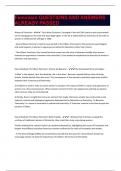Tentamen (uitwerkingen)
Feminism QUESTIONS AND ANSWERS ALREADY PASSED
- Vak
- Instelling
Waves of Feminism - - First Wave Feminism: Emerged in the mid 19th century and concentrated on the campaign for the vote and equal legal rights. In the UK it ended with the extension of the vote to women in 1918 and full suffrage in 1928. - Second Wave Feminism: Held to have started in the 1960s...
[Meer zien]




